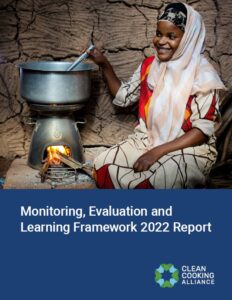Monitoring, Evaluation and Learning Framework 2022 Report
The Clean Cooking Alliance (CCA) collaborates with a worldwide network of partners to foster an inclusive industry capable of ensuring universal access to clean cooking. Our commitment to effective Monitoring, Evaluation and Learning (MEL) plays a pivotal role in accelerating transition to clean cooking, amplifying impact, and fostering ongoing improvement. By prioritizing MEL, CCA strives to make the most significant contribution to the advancement of the clean cooking ecosystem.
Report Purpose
CCA’s MEL Framework is a foundational tool that aims to systematize measurement and learning across CCA’s work. This MEL Framework 2022 Report builds upon the 2020 and 2021 Monitoring and Evaluation (M&E) Framework Reports and includes the following components:
- CCA’s Theory of Change (ToC) (see Annex F).
- A three-level approach comprised of guidance and requirements at the project, organization, and sector levels.
- A list of Standard Indicators (SI) tracking against the Theory of Change (see Annex A).
- Data on the impact of CCA’s support to enterprises.
- A learning agenda to help CCA become an efficient and effective learning organization that generates, disseminates, and acts upon learning to achieve universal access to clean cooking by 2030.
Standard Indicators are pivotal in effective MEL practices. They serve as fundamental metrics for gauging progress and impact in various sectors of the clean cooking industry. With 2022 marking the MEL Framework’s third year in action, this report delves deeper into the yearly progression of SI and their correlation with enterprise growth. The trends observed underscore that enterprises operating within the clean cooking sector have not only sustained their growth but have also shown remarkable expansion since the beginning of CCA’s assistance and tracking. This consistent pattern of enterprise expansion throughout the duration of CCA’s assistance highlights the significance of CCA in driving the industry’s overall growth trajectory.
Methodology
The set of CCA SI in the MEL Framework pertain to various levels of the organization’s work, including four Impact-level Indicators (IL) that measure CCA’s impact on improving health, reducing climate and environmental degradation, and promoting gender equality.
By leveraging established data management systems, a robust set of methodologies was used to estimate increased access to clean cooking solutions in countries where CCA-supported enterprises operate. CCA also conducted analysis on its direct impact on averted deaths and averted disability life adjusted years (ADALYs), carbon dioxide equivalent (CO2e) and black carbon equivalent (BCe) emissions reductions, woody biomass use averted, and time savings.
2022 Highlights and Impact
In 2022, CCA developed an organization-wide learning agenda, shifting from traditional M&E methods to an MEL framework. In 2023, the learning agenda’s three components (a set of key organizational long-term questions, a learning system, and MEL guidelines and resources) was implemented, enabling the organization to not only generate and apply learnings but also address critical questions emerging
in the clean cooking sector.
The indicator data presented in this report demonstrate the breadth and impact of the work carried out by CCA in both 2021 and 2022. There are approximately 163 active enterprises in the clean cooking sector, 26 of which were supported by CCA in 2022. Information gathered indicated a 78% increase in fundraising between 2021 and 2022, resulting in a total of over US$ 211 million in investment in 2022. Among surveyed enterprises, clean cooking derived revenues increased by almost 89% from 2021 to 2022.
For the bigger players in the industry, these data show that fundraising is going well, indicating increased resilience among those enterprises.
CCA’s IL 1–4 impact data show that, for activities in 2022, 767,687 households increased their access to clean cooking solutions. Of those households, 606,003 adopted clean fuels, 160,255 adopted transitional fuels, and 1,430 adopted improved biomass. Households that increased their access with support by CCA programs contributed to:
- Over 17,000 ADALYs and over 300 averted deaths.
- A reduction of almost four million tons of CO2e emissions. This is equivalent to taking almost 844,000 gasoline powered cars off the road for one year.
- Over 1.8 million metric tons of woody biomass use averted. If all woody biomass used came from live trees (i.e., no harvesting from felled or dead trees), this would equate to over 9.3 million saved trees.
- Almost 485 million hours saved after gaining access to clean cooking solutions. By monetizing these savings, CCA estimates that this has led to time savings of almost US$ 90 million.
Lessons Learned and Next Steps
The past three years, characterized first by the COVID-19 pandemic and, more recently, the global energy crisis, have posed significant challenges for clean cooking enterprises. CCA’s support, in the form of technical and financial assistance, played a crucial role in assisting enterprises address a challenging global environment. CCA’s support enabled enterprises to not only maintain their operations but also grow, as demonstrated by their increased revenues and sales. Despite the challenging operating context, the clean cooking sector has also experienced significant progress which CCA has observed through the innovation, diversification, and growth of the sector.
In 2023, CCA will continue using the MEL Framework to collect data for its SI, including further improving and expanding on the calculations to measure the health, climate/environment, and gender impact of its work. The forthcoming MEL Framework implementation will include and be influenced by:
- Continued engagement with internal teams and external partners on potential MEL workstreams.
- Refined data collection and management systems and practices.
- Further disaggregation of direct and indirect impact data. Honing of calculation methodologies to better measure the direct and indirect impact of CCA’s work, especially for IL 1–4.
- Expanding CCA’s role in the clean cooking ecosystem.
CCA will also begin the implementation of its learning agenda—tracking and measuring progress related to learning across activities—to improve its ability to learn from its work and address the most critical questions in the clean cooking ecosystem. The learning agenda will help CCA advance in its mission to achieve universal access to clean cooking.
To read the report, click here.

